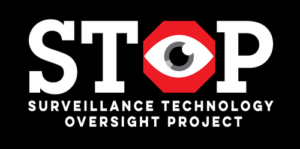Clinic Supports S.T.O.P. in Cell Tower Dump Case
Cyberlaw Clinic » Blog 2021-12-09
 Yesterday, the Massachusetts Supreme Judicial Court heard oral arguments in Commonwealth v. Perry, a case about the constitutionality of cell tower dumps. The Cyberlaw Clinic was honored to represent the Surveillance Technology Oversight Project as amici in this important case. S.T.O.P.’s brief (pdf) argues that cell tower dumps are an unreliable and unconstitutional form of dragnet surveillance.
Yesterday, the Massachusetts Supreme Judicial Court heard oral arguments in Commonwealth v. Perry, a case about the constitutionality of cell tower dumps. The Cyberlaw Clinic was honored to represent the Surveillance Technology Oversight Project as amici in this important case. S.T.O.P.’s brief (pdf) argues that cell tower dumps are an unreliable and unconstitutional form of dragnet surveillance.
The case stems from a police investigation into a series of armed robberies. In the course of the investigation, the Commonwealth and the FBI obtained cell tower information from four major providers at six different times and locations. The type of information obtained, called a “cell tower dump,” included the phone numbers, account information, and call information for every cellular network customer who was connected to any of the targeted cell towers during the relevant times. This led to the government obtaining over 50,000 individuals information. One of those individuals, Jerron Perry, was eventually charged. He challenged the admissibility of the cell tower dumps at trial. The trial court ruled against him, prompting an interlocutory appeal to the Supreme Judicial Court.
S.T.O.P., through its counsel at the Cyberlaw Clinic, filed an amicus brief in support of Mr. Perry. S.T.O.P., a non-profit advocacy and legal services organization, has worked to end the practice of cell tower dumps in New York through the legislative process. As such, S.T.O.P. is intimately familiar with the potential harms and abuses associated with this type of surveillance. Like other forms of dragnet, pattern-based surveillance, cell tower dumps are prone to errors and bias. Moreover, similar location-based surveillance and predictive policing technologies have proven ripe for abuse. Just like the general warrants that gave rise to the Fourth Amendment, cell tower dumps give the government sweeping search authority. No warrant can pass constitutional muster when tens of thousands of uninvolved parties will be subjected to surveillance.
S.T.O.P.’s brief urges the Court to take these failings into consideration when deciding this case. At oral argument, several Justices asked questions that were raised by S.T.O.P., suggesting that the amicus brief has already had an impact. The Clinic is grateful to S.T.O.P. for the opportunity to work together on this issue, and to the Fall 2021 Clinic students Reem Hussein, Jack Shaffery, and Jess Valenzuela Ramirez, who authored the brief with oversight from clinical instructor Mason Kortz.